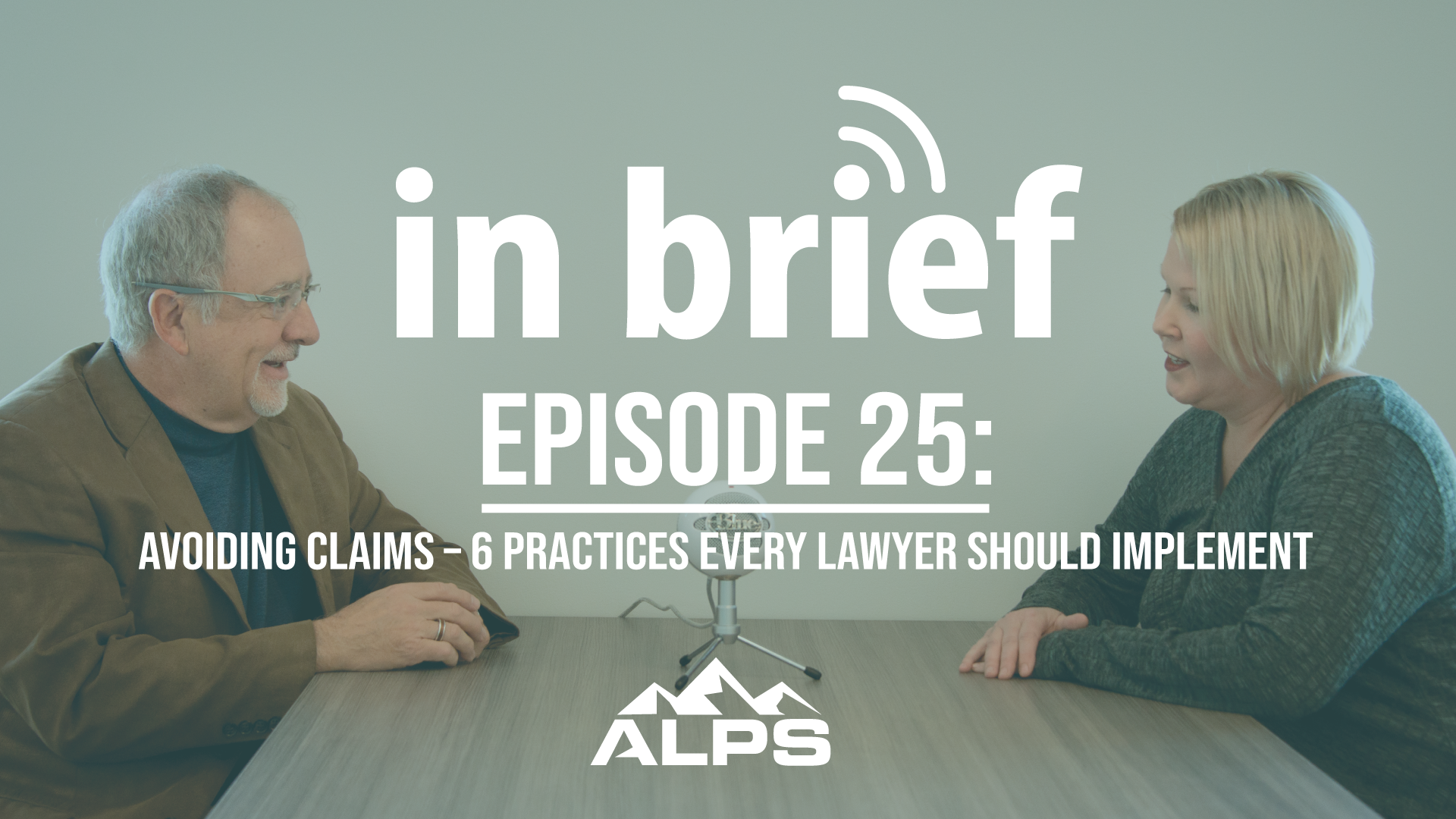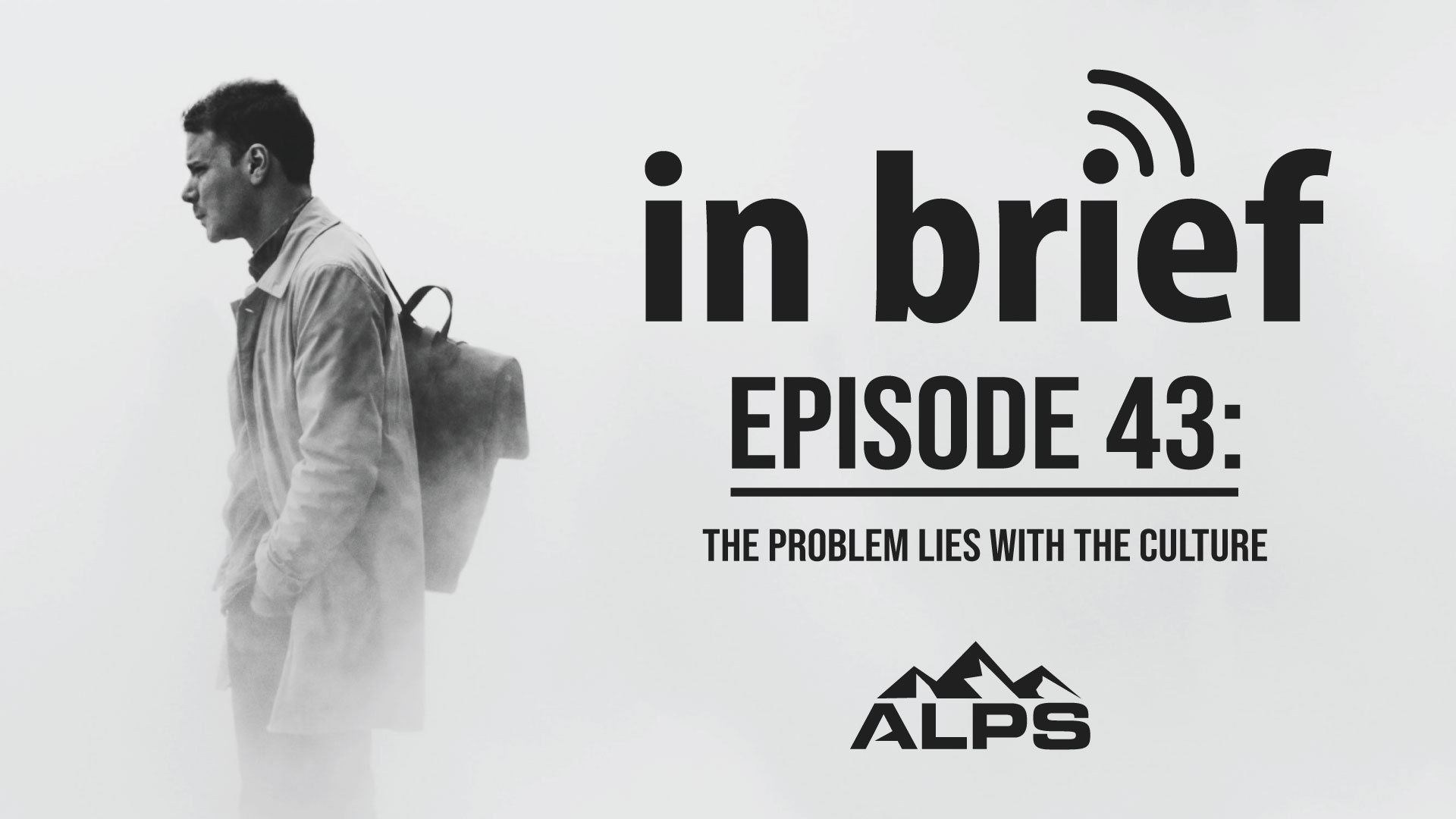9 min read
ALPS In Brief Podcast-Episode 3: Stay Away from the Gray Area. Reporting Claims.
There are a number of common questions that policyholders ask in regards to reporting claims. In this episode, ALPS Claims Attorney John Ries talks...
We've crafted solutions tailored to your firm
The world of insurance for law firms can be confusing, and difficult to navigate. We've created this glossary because these common insurance terms should be easy to understand.
11 min read
 Mark Bassingthwaighte, Risk Manager
:
Updated on February 28, 2024 | Posted on November 21, 2018
Mark Bassingthwaighte, Risk Manager
:
Updated on February 28, 2024 | Posted on November 21, 2018

In this episode of the ALPS in Brief podcast, ALPS claims attorney Kobi Gibbs sits down with ALPS Risk Manager Mark Bassingthwaighte to offer examples and advise on best practices to implement to avoid finding yourself dealing with claims.
ALPS In Brief, The ALPS Risk Management Podcast, is hosted by ALPS Risk Manager, Mark Bassingthwaighte.
Transcript:
MARK:
Oh, there we go. Okay. Hello. This is Mark Bassingthwaighte. Welcome to the latest episode of ALPS In Brief, the podcast that comes from you from the historic Florence building in beautiful downtown Missoula, Montana. And today I’m very pleased to have as our guest Kobi Gibbs, a long-time friend and colleague here at ALPS, and Kobi, before we jump into the discussion we’re gonna have today, could you take just a few moments and tell our listeners a little bit about yourself?
KOBI:
Sure. I have been at ALPS for almost 15 years. I started out in private practice in Billings, Montana, doing tax and estate planning, real estate transactions, and then went to the public defender’s office in Yellowstone County and worked on felony criminal cases. So, quite a jump.
MARK:
Yes.
KOBI:
Got a little trial practice and then was offered the job at ALPS and was able to come back to Missoula.
MARK:
And ALPS has been privileged to have you here ever since. It’s been a lot of fun. What I would like to talk about today, Kobi … Sort of what got me started here was there was a movement I remember years ago that started in Australia that has since gone to several provinces in Canada and now it’s beginning to come to the United States. Both Colorado and Illinois are looking at this and basically it’s called Proactive Management Based Regulation. And the gist of it is bars are starting to think, ‘do we better serve the public by promoting the ethical practice of law as opposed to disciplining lawyers after something has happened?’ And so the idea is: encouraging lawyers and law firms to look at practices and procedures and to do a lot of training and education. Again, being proactive about how we just practice so that we try to avoid the ethical failings or shortcomings that some lawyers find themselves in.
MARK:
And so in light of that, I thought it would be very interesting to just visit with a claims attorney and get your perspective, because there’s a lot of overlap with discipline and claims in terms of just the kinds of trouble some lawyers find themselves in. And I’d really just appreciate some of your thoughts when we talk about proactive risk management. From a claims perspective, could you share with our listeners the kinds of things you think about, say these are … ‘If you could implement these practices, I think this would go a long way in having you avoid finding yourself in situations where you’re dealing with claims.’ So, what are your thoughts?
KOBI:
Sure. I think the first critical issue is client selection. So, just not accepting every client that walks in your door. That can be hard when you’re a solo practitioner and in a small jurisdiction where you need to make … Pay the bills. But, I don’t know how many times, I can’t count how many times, literally, I hear, ‘I knew I shouldn’t have taken on this case or this client. It was a problem. It was … This person was going to be a problem. They were difficult from the initial meeting.’ And so if … That would be my number one suggestion is if you have any ability to really think and trust your gut on whether to accept a client or not, it will save you so much trouble in the future.
MARK:
And when I think about that, I’d also say at times, even when I was in practice, you occasionally end up with somebody you realize after the fact isn’t somebody you necessarily … I mean, could be the potential problem client — you know you shouldn’t have taken them on. I think, I would just encourage folks, if you find yourselves in that situation, get out if you can, or at a minimum, at least learn what you missed … So, next time you can say, ‘oh, I need to ask these kinds of questions to make sure that I don’t land in this situation again.’ But what other thoughts do you have? That’s number one. I assume that …
KOBI:
Well, number two, I know … This kind of goes along with, even if you have … No matter what your client, if they’re difficult, if you’re getting along with them great, they need to be updated and you need to have good communication with that client.
MARK:
Right.
KOBI:
We … That’s where ethical complaints start is when it’s a client you don’t really wanna deal with or it’s a case that you don’t wanna deal with, you’ve put it off and then the telephone calls don’t get returned, the communication doesn’t get returned and clients start to get very frustrated by that very quickly. And so I would say having just very clear communication. Also documenting in your file. That is critical. In writing. I will ask if this attorney, when they come to us and have an issue, if that, if there’s any documentation of that decision being made by the client in writing in the file and when there isn’t that written documentation, it makes our job a lot more difficult to defend that attorney.
MARK:
And so what I’m hearing from this is it’s not just about trying to preserve some emails or just what we’re talking with the client about, but am I understanding correctly that you’re really trying to say we need a written record of the advice being given, how the decisions are being made. Am I correct? If that’s …
KOBI:
Yes.
MARK:
Okay.
KOBI:
So, on any major decisions, whether the client is following your advice or, especially, not choosing to follow your advice, document it in writing. And why? Because, for example, if the client says ‘I am okay with taking this risk,’ you’ve advised them of the risk and there are two different paths to go down and they say, ‘I’m good with taking that risk.’ Well, if you document that, and — it can just be an email … It doesn’t have to be critical — they don’t have to sign off on this giant waiver.
MARK:
Right.
KOBI:
But, just documenting that ‘yes, this was discussed, the pros and cons, and the client chose to take this risk or this … to pursue this strategy.’ Then, if the case does not proceed — because there’s always going to be a winner and a loser, so to speak — if the case doesn’t go as the client wants and it comes back on that decision, you have it documented that that was a knowledgeable decision. They were informed before they made it. But when we don’t have that documentation, it is much more difficult.
MARK:
And I wanna underscore because I think there’s another point you’ve made that I wanna make sure is very clear for folks. As we sit here and you’re talking about … how documentation is particularly important when the client may be doing something that is not necessarily what the attorney’s advising. Am I understanding correctly that you were also suggesting that the attorney advise — and then of course document the client — that the client is aware or made aware of the legal ramifications of making this decision against the advice of the lawyer? And am I understanding that correctly?
KOBI:
Yes. Yes.
MARK:
Perfect, perfect.
KOBI:
And kind of another suggestion along this line is in your retention letter, whether you’re gonna limit the scope of representation. So many times we find it’s just handling this personal injury case. Well, that includes everything then.
MARK:
Right.
KOBI:
And so if you aren’t going to handle say, tax implications, investing, the settlement finds — that needs to be clearly documented in the file or in the retention agreement. And just again, with clear communication. So, the client knows what you’re doing, what you’re not doing. If they need to hire separate counsel to do something or get separate advice from another (a CPA or another professional), but that you’re not … that you have not agreed to take that on and so you’re not later blamed for anything slipping through the cracks.
MARK:
And I think that is really, very sound advice. We tend to think of … What we’re really talking about is limited scope representation and we tend to think of that in the context of, ‘I’m intentionally sitting down and I’m only gonna do this little piece.’ And I think lawyers do a pretty good job of that, but I think in lots of situations where we are providing full service, so to speak, that clients may have some assumptions about, ‘what if I’m hiring this plaintiff lawyer and he or she’s gonna do everything under the sun for me,’ that it’s important to document that the client understands, ‘no, we don’t do work comp here and there’s a work comp component.’ So. Great, great advice. Okay. Other thoughts?
KOBI:
Calendaring is still a big issue. I’m sure everyone is aware of how critical deadlines are and having someone, a redundancy. So, whoever’s entering the deadlines, there’s somebody else checking or there’s some backup, not the same person double checking. But, we still see so many missed deadlines and whether it’s a failure to properly calendar or a failure to react to the calendar, because the attorney has too many cases or is too overwhelmed, we still have a lot of missed deadlines.
MARK:
And we really are seeing mistakes that … failure to react to calendar and calendaring missteps … we’re seeing areas … I mean, I guess what I’m trying to ask you, it’s easy from a risk management perspective — these things can happen and I just wanna underscore that you’re really telling us ‘yes, we do have claims where the calendar worked and for whatever reason nobody did anything anyway’ and it’s just … Am I hearing correctly?
KOBI:
Exactly. Exactly.
MARK:
Wow.
KOBI:
Yes. For example, if there is a … If there’s not a routine review of deadlines and someone else checking, I have had situations where a deadline came in between a couple of big cases that had other huge deadlines and so those were pushed to the front to triage, so to speak, and so a deadline that was thought maybe to be less critical was missed. The attorney thought maybe they could fix it, such as supplementing an expert disclosure, but in fact the court then doesn’t allow that supplement and then the case is thrown out and so those kinds of things. It can happen. And so it sounds easy, but having extensive calendaring. The other issue is conflicts of interest and really not only looking … Having everyone in the firm sign off on the clients but also on what they’re doing as far as the types of cases. So, you don’t have two clients who are competing for the same … Let’s say Pepsi and Coca Cola. You can’t represent both.
MARK:
Right.
KOBI:
But I think that’s starting to become a bigger issue and so you need to be thinking about that in how to implement that in your conflict procedures.
MARK:
One of the things that I hear in experience in terms of the lecturing and consulting I do is you’ll find lawyers that practice in litigation. They, for the most part, get the significance of the conflict issue and they have various systems in play and we try to work with them if it’s a little light on process, but more and more I’m coming across transaction lawyers that really kind of dismiss the conflict problem and they just don’t see that as nearly significant, because we’re not adverse, in the sense of litigation. Do we see conflict claims that come out of transaction practices? I mean, is … Are they justified in saying, ‘I don’t have to worry about this’ or as a claims attorney … how do you respond to that one?
KOBI:
No. There are still going to be conflicts that are going to arise. And it’s really not whether you think there’s a conflict.
MARK:
Yes.
KOBI:
It’s whether the client thinks there’s a conflict and sometimes the opposing counsel will bring it up. And so that can … And maybe it’s justified, maybe it’s not, but sometimes it can be a strategy to try and get people off of a case.
MARK:
Right.
KOBI:
But, if you are confident in your process and that there isn’t a conflict, then you can defend that very easily or respond to that allegation.
MARK:
Right. Yeah. And I think some things that lawyers miss at times … If we have a conflict that means, well, we can’t do anything. And, you know, there are times where there are non-waivable conflicts. I mean, we’re both well aware of that, but there are times where ethically it’s permissible to proceed with informed consent. Sometimes there’s a screen that can be put in place. So, it just depends on the circumstances, but if we’re not looking for them, I mean, that’s a huge issue.
KOBI:
Well, for example, a significant issue is with business startups and so who is your client? When you have two partners come to you that wanna set up an LLC and maybe they’re gonna split it 50/50, maybe they’re not. Maybe one client comes back later and says, well, I want it 51/49 or if it’s 50/50, who’s gonna be the tie break? So, really are you representing the LLC that you’re forming or are you representing one of the members? ‘Cause you can’t do both.
MARK:
Right.
KOBI:
And so on those business transaction issues that’s a critical one to be aware of.
MARK:
Okay. That’s a great example. Yeah. Yeah. And I wanna underscore, again — I can’t help it from the risk perspective — maybe ask you this final question on conflicts. The temptation is to focus on systems and I certainly do not wanna minimize the importance of an automated conflict checking system that can be done in real time in terms of first contact and tracking all the types of information that normally should be tracked, but from your experience here at ALPS and thinking about conflict claims, are they more frequently an ‘oops, we missed that name’ kind claim or are they more frequently a ‘conflict might have been recognized, but we didn’t resolve it properly.’ You see what I’m saying?
KOBI:
Exactly.
MARK:
What should … Do we see both? What would you say is the …?
KOBI:
We see both.
MARK:
Okay.
KOBI:
But I would say more often than not, the firm has decided it’s a waivable conflict and hopefully they follow through with getting the waivers, but sometimes they haven’t.
MARK:
Yeah.
KOBI:
And the other party may … It may not be a conflict right now, but it may be something they need to be thinking about in the future. And so they might’ve thought about it and thought it’s … This isn’t gonna probably arise, but when it does arise in the future then it’s a conflict that might not be waivable.
MARK:
Yeah.
KOBI:
So, again, just making sure the client is informed so they can make informed decisions as well. Maybe they’re fine with waving it. Maybe they realize the relationship.
MARK:
And I think that is an excellent point, ’cause I find lawyers at times really wanting to say, well, we’ve identified the conflict and we can decide how to work through. The conflict if you will, doesn’t belong to the lawyer. It belongs to the client.
KOBI:
Right.
MARK:
And they get to decide if this is waivable or not, assuming ethically it would be. But, they don’t have to waive. Interesting. Good stuff. Kobi, this is fantastic information and I think you’re so spot on on everything. We’re nearing the time we need to wrap this, but do you have any final closing comments or other tips you’d like to share? I’ll just give you the, give you a moment.
KOBI:
I guess the last thing would just be: be informed when you’re going into additional areas of practice. We always say don’t dabble. We’re not wanting to discourage people from learning new areas of practice, but if you don’t realize … If you don’t know what you don’t know and so that can come up and especially if you’re, say, working in a family law case and then all of a sudden a bankruptcy arises, do you need to consult with someone so that you’re making sure you’re not violating the automatic stay? So, things like that.
MARK:
Yeah. We do see a lot of substantive law missteps, if you will. And I think I would absolutely agree with you that this is a great piece of advice. Just don’t shoot from the hip.
KOBI:
Right.
MARK:
Take your time. If you need a co council, you need a mentor, you need to actually research the law, you’ve gotta take the time to do that. So, point well, well taken. Well, this concludes this episode of ALPS In Brief. I hope all of you listeners found something of value today and please don’t hesitate to reach out to any of us here at ALPS anytime if we may be of service and if you have thoughts of somebody you’d like to hear in a podcast in future or a topic you’d like to hear discussed, please don’t hesitate to reach out at me at mbass@ALPSnet.com. Thank you for listening folks. Kobi, again, thank you very much. It’s been a pleasure.
KOBI:
Thank you.
MARK:
Bye bye all.
ALPS In Brief Podcast Intro/Outro Music: Walk In The Park by Audionautix is licensed under a Creative Commons Attribution 4.0 license. https://creativecommons.org/licenses/by/4.0/
Artist: http://audionautix.com/
Mark Bassingthwaighte, Esq., serves as Risk Manager at ALPS, a leading provider of insurance and risk management solutions for law firms. Since joining ALPS in 1998, Mark has worked with more than 1200 law firms nationwide, helping attorneys identify vulnerabilities, strengthen firm operations, and reduce professional liability risks. He has presented over 700 continuing legal education (CLE) seminars across the United States and written extensively on the topics of risk management, legal ethics, and cyber security. A trusted voice in the legal community, Mark is a member of the State Bar of Montana and the American Bar Association and holds a J.D. from Drake University Law School. His mission is to help attorneys build safer, more resilient practices in a rapidly evolving legal environment.

9 min read
There are a number of common questions that policyholders ask in regards to reporting claims. In this episode, ALPS Claims Attorney John Ries talks...

2 min read
Here at ALPS, all of us who work in claims and risk management periodically take calls from lawyers unsure if they need to report a claim. While we...

7 min read
ALPS Risk Manager Mark Bassingthwaighte shares two real-world stories of attorneys struggling with behaviors that often lead to malpractice claims....